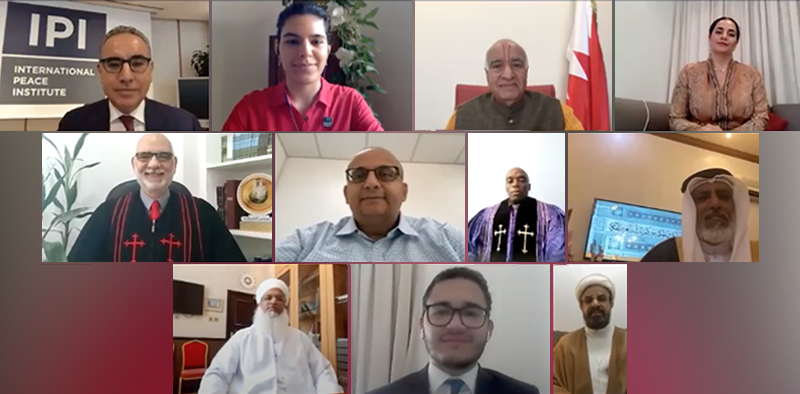
Interfaith leaders joined IPI MENA in calling for greater unity, cooperation, and solidarity across the multilateral system in tackling the challenges from the coronavirus pandemic as part of a virtual conference titled “Interfaith Solidarity in Covid-19” hosted by IPI MENA on July 8th.
Addressing imams, reverends, priests, pastors, religious and faith representatives across Islamic, Christian, Jewish, Hindu, Baha’I and Bohra faiths, IPI MENA Director Nejib Friji opened the conference by stressing the need to bolster multilateral tools to tackle the ramifications of this transnational pandemic that has affected all parts of society—and vulnerable groups in particular, including women, youth, and the elderly.
“Religion leaders are crucial civil society actors in the field of cultural diplomacy,” Mr. Friji stated, underlining the emphasis religions place on peace and security. “You are all invaluable sources of fostering understanding, reconciliation, tolerance, and reciprocal respect among religious communities which can provide a foundation for peacebuilding efforts.”
Highlighting IPI’s mandate of building resilient societies and managing risk, he noted that the Sustainable Development Goals (SDGs) and the United Nations calls for a ceasefire and permanent end to hostilities and conflict are crucial, and should be included in interfaith alliance’s support.
Mr. Friji concluded with a call for further solidarity and cooperation between all parties, at the local, regional, and international levels towards a proactive global response.
Shahnaz Jaberi, Trustee Member of the King Hamad Global Center for Peaceful Coexistence and representative of the Baha’i Religion, noted the importance the Baha’i community places on exploring the role of religion in enhancing unity, coexistence, and brotherhood among fellow citizens to overcome the social and economic consequences of the pandemic.
She called on all people, irrespective of religious affiliation, background, or gender, to serve humanity and unite in action, from the international stage to the grassroots, to combat the pandemic.
Her message was reinforced by Shaikh Salah Al Jowder, Imam of the Grand Mosque in Muharraq, who reminded participants that key stakeholders not only come from state-related institutions and governments, but from international organizations, private sector, and individuals as the pandemic impacts all indiscriminately.
Pastor Job Nelson of the Bethel Church of Nations in Bahrain focused on the silver lining of the pandemic—uniting people across religious faiths, ethnicity, race, and social status, and countering the divisions the pandemic has created through border closures and xenophobia.
Michael Yadgar, a member of Bahrain’s Jewish community, noted that the pandemic has presented an opportunity to scrutinize the availability of effective healthcare unilaterally. He also highlighted the importance of learning from the lessons the pandemic, notably that the environment has been spared pollution due to reduced transport, and that greater attention is being given to reconnect with humanity at a personal level.
Representative to His Holiness Dr. Syedna Mufaddal Saifuddin, Religious leader of the World Wide Dawoodi Bohra Community, Mustafa Zakavi referenced religious scripture in reinforcing the common duty of protecting each other by following healthcare guidelines. He pointed to the important role women are playing in his community through their sewing skills to create face masks for medical staff and frontline heroes fighting the pandemic.
Reverend Hani Aziz, Pastor of the National Evangelical Church of Bahrain highlighted the importance of the World Health Organization, the United Nations, and organizations such as IPI in providing a platform for unity during these trying times. He stressed the importance of governments in treating nationals and expatriates with the same care, and the need for solidarity across faiths following the closure of religious facilities to curb the spread of the virus.
Dr. Shaikh Majeed Al Asfoor, member of the Board of Trustees of the King Hamad Global Centre for Peaceful Coexistence, stressed that peace is the essential driver in uniting faiths. In highlighting the need for solidarity in following health-care guidelines to protect fellow citizens, he referenced a Quranic verse: “Whoever killed a person, it shall be as if he killed all mankind. Whoever healed a person, it shall be as if he healed all mankind.”
Chairman of the Krishna Temple in Bahrain Sushil Muljimal pointed to the important role governments can place in alleviating the burden on citizens. He applauded Bahrain’s treatment of citizens and non-citizens in this respect and called for greater gratitude towards hospitals, medics, and staffing units on the frontlines of the pandemic.
Related coverage:
“Interfaith Leaders Pay Tribute to Bahrain for Peaceful Coexistence,” Gulf Daily News, July 10
“The International Institute for Peace & Religious Leaders Express Solidarity against Covid-19,” Akhbar Al Khaleej, July 10
“The International Institute for Peace & Religious Leaders express their solidarity against Covid-19 and a tribute to the ongoing efforts within a preventive, proactive and curative strategy,” Delmon Post, July 9







